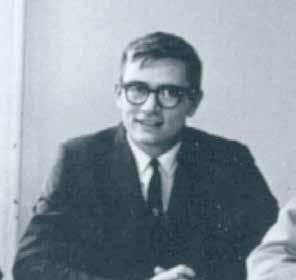
23 minute read
THE POWER OF POSSIBILITY
THE POWER OF POSSIBILITY
With one year remaining in the A model for living and learning campaign, donor generosity fuels new and existing projects.
Imholte, late 1960s
A MODEL FOR LIFE-CHANGING STUDENT EXPERIENCES: JOHN Q. IMHOLTE SCHOLARSHIP
Two-hundred and thirty-nine students have been able to make the most of their UMN Morris experiences, thanks to the John Q. Imholte Scholarship. The scholarship was established in 1990 to mark the retirement of the nowlate Imholte, who served as the campus’s top administrator for 21 years. Its purpose was to support UMN Morris students.
Harlo “Pete” Peterson ’64 has been supporting the scholarship fund since 1993. A member of UMN Morris’s first graduating class, Peterson remembers Imholte as not only a great professor, but also the epitome of what UMN Morris stands for.
“My first professor was John Q. Imholte,” says Peterson. “He was always an outstanding professor.”
Peterson says a lot has changed since his undergraduate days—cost to attend, scholarships offered—but one thing hasn’t: the value of a UMN Morris education and experience.
“Back then some classes were so small we met in professors’ offices. You could ask any question and get a good answer. To me, that’s a great education.” Carpenter

A MODEL FOR FACULTY LEADERSHIP: CHEMISTRY INSTRUMENTATION ACCOUNT
A conservative estimate by Professor of Mathematics Peh Ng puts the number of students mentored or taught by Professor Emerita Nancy Carpenter at 7,500. That’s a lot of undergrads.
Working with students is what Carpenter loved best about her job. So, on the occasion of her retirement, she left them a gift: the Chemistry Instrumentation Account, or CIA. Its purpose is to enhance their learning experience by supporting the repair, maintenance, and upgrade of instruments within the Chemistry Discipline.
“Using state-of-the-art instrumentation is crucial in the work that chemists do every day: it’s how we solve problems, it’s how we drive forward in research,” Carpenter says. “To me this is a way of saying ‘thanks,’ of giving back to help our students get the great education they deserve.”
Carpenter’s gift isn’t only a gift to her students or the campus, though. It’s also a gift for the greater good.
“Since our ‘be all end all’ is to prepare our students to become creative problem solvers who can help solve issues that face our global citizenry, doing this to help them have a better education impacts everyone,” she adds. “Our students will get the excellent education they deserve and will be able to use it to make new pharmaceuticals or make new materials for solar cells and so on.”
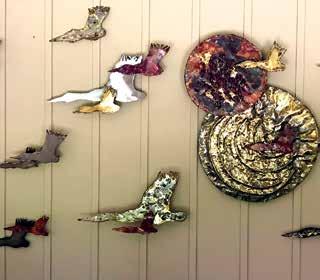
A MODEL FOR BEAUTIFUL, SMART SPACES: LAFAVE HOUSE ARTWORK
It’s no secret the Morris campus is a thing of beauty. One of its most iconic spaces, the LaFave House, offers visitors, friends, and newcomers a warm welcome to the University. The house serves as a gathering place for campus and community functions and is known for its friendly and comfortable, but also elegant, atmosphere. It’s also known for its permanent art collection, which grew this year with the addition of a new piece.
Thanks to the children of Edward and Patricia Paul LaFave, “Metal Waterfowl Sculpture” by Silas Seandel now hangs in the sunroom. There the fired copper and bronze can catch the morning light. Commissioned in 1977 for Citizen’s Bank of Morris, the work is a piece of campus and community history, illustrating the connection between the two.
“There is a clear commitment to keeping the connection between the campus and the family alive through the generations, and items like this sculpture serve as one of those connection points,” says Conferences and Events Coordinator Kellcee Baker ’10, who manages use of the house. “Guests of the LaFave House are always commenting on the beauty of the house and what it represents. The sculpture, installed in the sun porch, is a fun surprise for our guests and another option to learn about the LaFave family.” Bowman family

A MODEL FOR REGIONAL RESILIENCE: MORRIS COMMUNITY SOFTBALL
There’s something special about a softball game on a perfect summer day. Thanks to the generosity and vision of community partners, the campus softball fields we know and love will soon be bigger and better. With three new fields, upgraded seating, a concession stand, press box and more, the new Morris community softball facility will transform the experience of players and fans while boosting the local economy.
UMN Morris and Morris Area Schools have a strong history of working together on facilities like Big Cat Stadium and the shared track. The new community softball complex will provide life-changing opportunities for student-athletes of all ages to grow and play on one of the finest fields in west central Minnesota.
Robi and Ray Bowman have seen firsthand what the softball fields mean to their community: their daughter, Emma, has loved the game her entire life and has spent a lot of time on those fields. So the Bowmans, through the Harold Lee and Vernita Ruth McEachern Family Foundation, made a gift to the Morris Community Softball Fund; now they can’t wait to see Emma and area athletes play at the new complex.
“Being passionate about the high school, Morris community, and UMN Morris, it was a perfect fit for us,” says Robi. “Watching the Morris community, the school, and UMN Morris come together for another joint project has been exciting. The fields will have multiple uses and will be played on and enjoyed for several years to come.”
QUEEN OF THE PRAIRIE
Once upon a time, an experiment was launched on the edge of the Minnesota prairie. A group of visionary men and women believed in what the liberal arts could do for rural young people and what a college campus could do for the local economy. So they fought for a University of Minnesota campus to be established in Morris. And they succeeded. In the years to come, the campus and its community grew. They were tested. But through hard work and dedication, that experiment became one of the nation’s best public liberal arts colleges. And 60 years later, its story is ongoing.
Former Dean and Vice Chancellor (1979-1995) Elizabeth S. Blake knows this story better than most. Affectionately known as “Bettina,” Blake served the Morris campus for more than 25 years, as chief academic officer and a professor of French. Once dubbed “the Queen of Liberal Arts” by her University colleagues, she was a key figure in the early success of UMN Morris. Today she remains its passionate champion and an equally passionate defender of its educational philosophy.
Blake knows the liberal arts are not just for the social elite, because the Latin phrase artes liberales means “education for free citizens.” She sees liberal arts as a vital component of American democracy, especially as a necessary preparation for citizen leadership. So we asked Blake about her commitment to the liberal arts at UMN Morris and how philanthropy helps advance the campus mission.
Blake on the value of the liberal arts...
The phrase “liberal arts” is very difficult to use as a public label because people associate it with political views, so I have always emphasized what it really means. The phrase comes from our European tradition of wanting to prepare people for the greatest kinds of leadership in their communities. What I have tried to say, always, is that if you have young people who are intellectually capable of college-level learning, you should give them a liberal arts education because it opens the door to different kinds of leadership. You can be a leader in your community, or in your profession, or in any area important to you. Once you have this kind of education, people turn to your leadership expecting you to show them how to move forward. The word
“liberal” in Latin does not refer to a kind of activity—it refers to free citizens in a democratic society. I have always emphasized that and made my gift with that purpose in mind: to support the basic kinds of knowledge that should be taught at Morris to move forward our democracy, our country. It’s complicated, but also so simple.
On supporting the academic mission:
Everybody on campus has to know what the mission of the campus is and be able to reinforce that with students and others. Once completely won over by the idea of a good liberal arts education, you want to support it. You do not want to lose this precious thing that shapes your life. It kind of builds on itself.
It is amazing. I have had UMM students tell me they had wonderful conversations with a custodian in their residence hall. That is great if what is going on in the classroom is reflected everywhere else on campus. It reinforces what is going on in the classroom. To me, that is the ideal: what you are doing in one subject or classroom reinforces what you are doing elsewhere. About Blake Elizabeth S. Blake, professor emerita of French, served as vice chancellor for academic affairs and dean from 1979 until 1995. She currently resides in Boston, Massachusetts, where she continues to be an active scholar and writer. Blake’s philanthropic giving celebrates and strengthens the success of the University of Minnesota Morris as an undergraduate liberal arts campus and contributes to its continuing quest for high distinction in baccalaureate education.
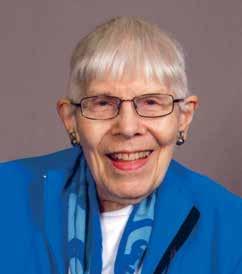
Blake in her office in 1980.
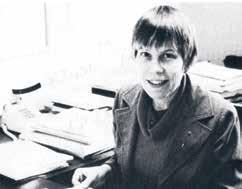
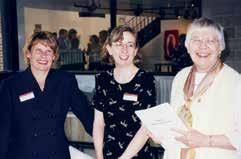
Maddy Maxeiner, vice chancellor emerita for external relations; Nancy Carpenter, professor emerita of chemistry; and Blake at the 2001 Honors and Awards event.
As mental health crises on campus and in the community increase, the University of Minnesota Morris must find creative ways to improve student wellbeing. That’s why the Public Safety department is adding a new officer to the force: a therapy dog.
Known affectionately as Archie, this therapy dog will foster relationships, comfort victims, and contribute to the health of the Morris campus and rural community. The first of its kind at a Minnesota college, this program responds to the needs of UMN Morris students in a way that is unique to the campus culture: a relationship-based, student-centric solution.
Research shows that interaction with a therapy dog reduces blood pressure, lowers stress, stimulates memory, and more. Archie will help students build positive relationships with Public Safety while overcoming barriers to graduation and future success. He also will help Public Safety provide mental health resources and victim advocacy throughout the Morris area.
“Archie will assist our department in bringing a greater level of service to the population we serve, on campus and in the community,” says Director of Public Safety Rob Velde. “Therapy animals prove to be excellent tools to help people in need. And who doesn’t like to pet a dog, no matter their situation or mood?”
Archie began training in late spring and spent six weeks this summer at a training camp. When he is certified, he will be part of the Morris Let’s Thrive program. Morris Let’s Thrive is a holistic campus initiative infusing evidence-based mental health and wellbeing practices, skill building, information and resources into UMN Morris students’ curricular and co-curricular life. Learn more at students.morris.umn.edu This program is made possible thanks to the private giving support of donors and friends.

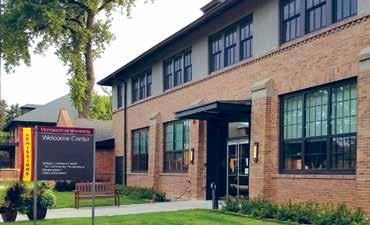
Outreach units at the University of Minnesota Morris have been named the Clifford J. Benson Center for Community Partnerships. This naming honors a leader in campus history and strengthens the University’s work in engagement, sustainability, and rural vitality.
“Senator Clifford J. Benson was dedicated to developing leaders who could ensure that rural communities can continue to thrive,” says Administrative Director of Civic Learning and Engagement Argie Manolis. “For more than 25 years the University of Minnesota Morris has been dedicated to campus-community partnerships that address community needs in small towns and ensure that our students can learn from—and become—the leaders rural communities need. Coordinating our engagement work under one umbrella will strengthen our ability to do both, and to honor Senator Benson’s life and legacy.” Benson was a key figure in obtaining and locating the University of Minnesota campus in Morris.
Senator Benson often said that UMN Morris was his greatest achievement. His family still keeps the golden shovel he utilized at groundbreakings. And they are proud of his legacy on campus.
“This is a fitting recognition of his efforts,” says Benson’s son Steve. “My dad was a driving force behind UMM. He wanted to make things better for young people in western Minnesota. He was always for small Benson Midwestern communities.”
CLIFFORD J. BENSON
Cliff (C.J.) Benson (1906–92) was an attorney and Minnesota State Senator from Ortonville from District 48 from 1959–62 and from District 24 from 1963–72. Those districts represented Morris and a large section of west central Minnesota. Senator
CENTER FOR COMMUNITY PARTNERSHIPS
The Center for Small Towns (CST), Office of Community Engagement, and Office of Sustainability comprise the Clifford J. Benson Center for Community Partnerships, as approved by the campus community on March 3, 2020.
DABBS EARNS HORACE T. MORSE AWARD
Associate Professor of Art History Julia Dabbs has earned the Horace T. Morse - University of Minnesota Alumni Association Award for Outstanding Contributions to Undergraduate Education. The award honors excellence in undergraduate education across the University of Minnesota.
“Julia is clearly an extraordinary asset to our campus and to the University of Minnesota, with an impressive and creative range of support for undergraduate education,” writes Vice Chancellor for Academic Affairs and Dean Janet Schrunk Ericksen. “She has demonstrated well that art history is a vital, active field of study with much to offer students and the larger community.”
An art historian with an interest in public art and the work of women artists, Dabbs writes that she “teaches through art” how to understand the world and how it’s visually rendered from artist to artist. Her field, she says, is an essential one to study, although often overlooked.
“Art history is not always considered ‘essential’ in our culture today, but to my mind, it is essential, and the skills our students gain can be intertwined with studies in the sciences, social sciences, education, and other humanities fields,” writes Dabbs. “We analyze and examine life, as expressed in visual objects; we interpret those findings, and then we communicate meaning to help others learn, assess, empathize, and ideally, gain inspiration.”
As she enters her “third decade as a teacher-adviser-researcher,” Dabbs reflects on her contributions to undergraduate education at the University. She’s helped hundreds of students from a variety of majors through her courses and community-engaged learning projects. She’s proud to have involved them in her research and to have taught them to appreciate what we see around us.
“It has been so rewarding to get students excited about art history, which is a subject they’ve usually not encountered before,” she writes. “When they tell me, ‘I’m going to go to museums more often now, or ‘art history is what got me through an emotionally challenging semester,’ I feel like I’ve done my job.” BURKE EARNS TATE ADVISING AWARD
Associate Professor of Communication, Media, and Rhetoric Barbara Burke is a 2020 recipient of the University of Minnesota John Tate Award for Excellence in Undergraduate Advising. Tate Awards recognize high-quality advising at the University of Minnesota.
Nominators say Burke “has taken every opportunity to develop and share her advising expertise and the programmatic reach of advising on the Morris campus, and she has changed student, staff, and faculty lives for the better in doing so.”
Academic advising at UMN Morris is unique in that faculty—not staff—serve as advisers. Burke describes the model as a partnership, one she says benefits UMN Morris students.
“Many of my advisees are also students in my class, so I think about them when research and professional opportunities arise,” says Burke. “I’ve gotten to know these students as people, and I’ve become aware of their skills, which gives them an added benefit.”
Burke remembers being an undergrad who didn’t know all of the ins and outs of the college experience or degree requirements. Today she aims to “demystify” these for students.
“As an adviser, I commit myself to listening to the needs and interests of the student as well as exercising my responsibility to be knowledgeable about University policies,” she says.
When asked what advice she has for today’s undergraduate students, she encourages responsibility, ownership, and confidence in the face of new stressors and challenges.
“I’m seeing more and more students facing more and more life stresses relating to economics, mental health, and career permanence,” she says. “But I believe our graduates are going to be learning throughout the rest of their lives. They’ll know how to ask good questions. They’ll know how to take action in creative ways.”
CAMPBELL EARNS UMN PRESIDENT’S AWARD Jonathan Campbell, assistant professor and director of jazz studies, earned the University of Minnesota President’s Award for Outstanding Service. An active artist, educator, and community member, Campbell shares his love of jazz with students, colleagues, alumni, and others. “I am extremely honored to receive this award and was speechless when I found out,” says Campbell. “For me, it is about giving back. Through performance and education, I absolutely love sharing and passing along this great art form with others.” Recipients of the President’s award demonstrate “an unusual commitment to the University community.” According to Campbell’s nominator, Professor of English and Gender, Women, & Sexuality Studies Julie Eckerle, Campbell is distinguished not only by what he does, but also by how he does it. Among the accomplishments cited by Eckerle in her nomination are Campbell’s efforts to create a Jazz Studies minor, his relationships with area high schools, prospective students, and alumni; his technical upgrades to campus facilities; his ambitious performance portfolio; and his efforts to integrate jazz into the Morris community. His work, she states, not only serves UMN Morris and students from a variety of majors, but also feeds a “hunger” long felt by the rural community—all with indefatigable enthusiasm.
“I stand in amazement of Campbell’s seemingly limitless energy and find myself immensely grateful for the fact that he has devoted this energy to the cultural life of our town, campus, and students,” Eckerle writes. “What he has accomplished since 2015 [when he joined the faculty at UMN Morris] and continues to create is truly ‘outstanding.’”
GOODNOUGH EARNS OUTSTANDING SERVICE TO UNIVERSITY SENATE GOVERNANCE RECOGNITION Associate Professor of Chemistry Jennifer Goodnough has earned the Outstanding Service to University Senate Governance Recognition. The award recognizes commitment to University shared governance. “I’m hard pressed to identify anyone who has done more good work for University Senate governance than Jenn Goodnough,” says her nominator, Professor Emerita Nancy Carpenter. “Anyone who knows her knows she is truly amazing at this work—her attention to detail, clear-thinking, and work ethic are unsurpassed. She has a passionate devotion to policy and a mind like a steel trap when it comes to retaining the details necessary to apply policy with integrity and fairness.”
Goodnough has been an active and dedicated participant in shared governance at the campus level for 15 years and systemwide for 10. Campus governance, she says, has the power to make the University stronger. And it is strengthened by participation from the community.
“When campus governance (both at Morris and systemwide) is working at its best, faculty, staff, students, and administrators are working together to make the University of Minnesota a place of excellence,” says Goodnough. “I think the key to making governance work at its best is having engaged people take advantage of the opportunities presented to be both a voice and an ear.”
OLSON-LOY EARNS NASPA PILLAR OF THE PROFESSION AWARD Sandra Olson-Loy, vice chancellor for student affairs, has been named a 2020 Pillar of the Profession by the NASPA Foundation—one of the organization’s highest honors. Senior student affairs officer at UMN Morris for two decades, Olson-Loy has devoted her career to developing a comprehensive studentlife program rooted in the University’s mission as a selective, rural public liberal arts college.
“Sandy’s work has been centered in bringing our UMN Morris public liberal arts mission and vision to life,” says Leslie Meek, professor emerita of psychology and a long-time collaborator with Olson-Loy. “She has done so in ways that have transformed this campus and the lives of our students. ”
“Sandy Olson-Loy is a pillar of the University of Minnesota Morris community,” adds Chancellor Michelle Behr. “Sandy’s strong institutional knowledge and experience are well balanced by her forward-looking understanding of the changes that are impacting higher education and our institution.”
An active volunteer, educational session presenter, and leader, Olson-Loy co-chaired NASPA’s Small Colleges and Universities Institute for senior student affairs officers in 2006 and, a year later, was invited to serve as the first division chair for small colleges on the NASPA board of directors. SCHULTZ EARNS FACULTY DISTINGUISHED RESEARCH AWARD Professor of Theatre Arts Ray Schultz has earned the 2019–20 University of Minnesota Morris Faculty Distinguished Research Award. The award recognizes sustained research and/or artistic productivity of a Morris faculty member over the course of a career. Schultz is the first recipient to represent the performing arts since the award was first granted in 2000.
“Since coming to UMM, I have accumulated a large portfolio of research and creative activity, which has added to my already substantial professional vitae,” Schultz writes. “My time here has made me more deeply appreciate the value of theatre in a liberal arts setting and has made me, I believe, a better artist and teacher for it.”
Schultz’s notable productions include Hedda Gabler (Austin Shakespeare), Hamlet (Austin Shakespeare), Letters of Tennessee Williams (Touring), Doubt (Detroit Repertory Theatre), Burn This (Performance Network Theatre), Next Fall (Performance Network), The Little Dog Laughed (Performance Network), Take Me Out (Performance Network Theatre), Angels in America (Meadow Brook Theatre), All My Sons (Meadow Brook Theatre), and more. His research interests include gay dramatic literature, particularly AIDS plays. Schultz has contributed numerous performance reviews to Theatre Journal. With Professor of Studio Art Jess Larson, he co-authored “Staging Sustainable Shakespeare,” which was included in Performance on Behalf of the Environment.
“One cannot emphasize enough that Ray not only excels in three distinct aspects of theatre (actor, director, and scholar), but also has made separate, significant contributions within his writing to the study of Shakespeare, LGBT/AIDS in theatre, and sustainable productions within an academic program,” writes Larson. “Ray exemplifies a commitment and excellence to research that is more than worthy of recognition with this award.”
JOHNSON EARNS ALUMNI ASSOCIATION TEACHING AWARD Assistant Professor of Biology Rachel Johnson has earned the 2020 UMN Morris Alumni Association Teaching Award. Johnson stands out among peers for her commitment to undergraduate teaching and learning. An immunologist, Johnson is a particularly appropriate choice this year.
“Given our current state of affairs, it is hard to overestimate the impact Johnson’s course development on vaccines, epidemics and now pandemics has had,” nominators write. “The particularly wonderful aspect of these courses is that they are for all our liberal arts students—not just science students. The need could not be greater, given Johnson’s emphasis on critical thinking and communication skills development.”
“Rachel has made extraordinary contributions to her students and the campus, providing an exemplary model of liberal arts learning both within and well beyond the study of biology,” adds Vice Chancellor for Academic Affairs and Dean Janet Schrunk Ericksen.
VUE ’20 AND CHRISTENSEN ’20 ARE FULBRIGHT FINALISTS Trina Vue ’20 and Mara Christensen ’20 are Fulbright U.S. Student Program finalists. Their successes speak to the power and value of a UMN Morris education on the global stage.
VUE
An English major, Vue was chosen to spend a year as an English Teaching Assistant in Thailand. There she will have the opportunity to teach children not only about English as a language, but also about the nuances of and diversity within American culture. “Growing up, I listened to my parents tell stories about their time as refugees in Thailand,” says Vue. “It always seemed like such a faraway place, even though they called it home, which is why this Fulbright experience means so much to me: because it will provide me with the opportunity to retrace my family’s roots and learn about a culture that I have always admired.”
CHRISTENSEN
An elementary education major, Christensen was chosen to spend a year as an English Teaching Assistant in South Korea. There she will have the opportunity to teach children not only about English as a language, but also about the nuances of and diversity within American culture. “I am honored to be awarded the Fulbright ETA to South Korea,” says Christensen. “This opportunity invites me to represent my culture and community on a global scale, while gaining a unique experience as a teacher and learning about another culture. I want to thank my professors, family, friends, and the Fulbright program for their support in achieving this humbling award.”
Five Morris students submitted Fulbright applications this year, supported by advising from faculty and staff through the Academic Center for Enrichment, and all were semifinalists. Christensen is one of two finalists.
“As one of the country’s top public liberal arts colleges, UMN Morris provides talented students access to life-changing educational opportunities,” said Chancellor Michelle Behr. “Our exceptional students are prepared to live as engaged global citizens, and we are excited for their upcoming Fulbright experiences.”
The Fulbright Program is the flagship international educational exchange program sponsored by the U.S. government and is designed to increase mutual understanding between the people of the United States and the people of other countries. Learn more at eca.state.gov/fulbright. Editor’s note: As this issue was going to press, a third UMN Morris finalist was awarded an ETA: congratulations, Anika Paulson!
Kemp Larson Lund Woodley
FOUR UMN MORRIS STUDENTS PRESENT RESEARCH IN IRELAND
Four University of Minnesota Morris students presented their research at the 70th Annual Irish History Students’ Association (IHSA) conference in Dublin, Ireland, this spring. Inspired by a conversation with author David Ebershoff, the students worked with Distinguished McKnight University Professor of English Michael Lackey to do serious research about the nature of biofiction. Their collaboration illustrates the kinds of opportunities students have at UMN Morris.
Bailey Kemp ’19, Claire Larson ’20, Nora Lund ’22, and Johannah Woodley ’22 first became interested in researching Irish biofiction after enrolling in Lackey’s class, where they read and analyzed biographical novels by Irish authors. Lackey urged them to submit their work to the conference.
Lackey mentored the students as they worked together to refine their abstracts. He believes this kind of close partnership is what makes the UMN Morris experience so impactful.
“Our classes are small, so I can work closely with students,” he says. “Because we have so much contact with our students, we can make a real difference in their lives. And when our students succeed, that makes a huge difference on our lives as professors.”
Kemp agrees, adding, “I feel incredibly lucky to have these opportunities as an undergrad, and even luckier to be in a place where the faculty and staff care so much about making these opportunities available and affordable.”
“Going to an international conference is a huge honor and it’s one of the great opportunities that the Morris campus offers,” adds Larson.
This activity was made possible by the English Discipline and the Division of the Humanities.
HANSMANN ’20, ADAMS ’03, WILLIE’S EARN COMMUNITY ENGAGEMENT AWARDS
Amanda Hansmann ’20, Kari Adams ’03, and Willie’s Supervalu earned 2020 Community Engagement Awards. Winners make a big difference on campus and in the Morris community.
“This year’s winners have worked to deepen and expand volunteer opportunities for pre-health students, welcome the Latino community, and provide sustenance and supplies that are needed for our community engagement projects,” says Administrative Director of Civic Learning and Engagement Argie Manolis.
Honoring UMN Morris’s mission to promote civic engagement, Community Engagement Awards recognize students, faculty, staff, and community members who have demonstrated exemplary commitment to community engagement. Honorees also earn Minnesota Campus Compact Presidents’ Awards.



